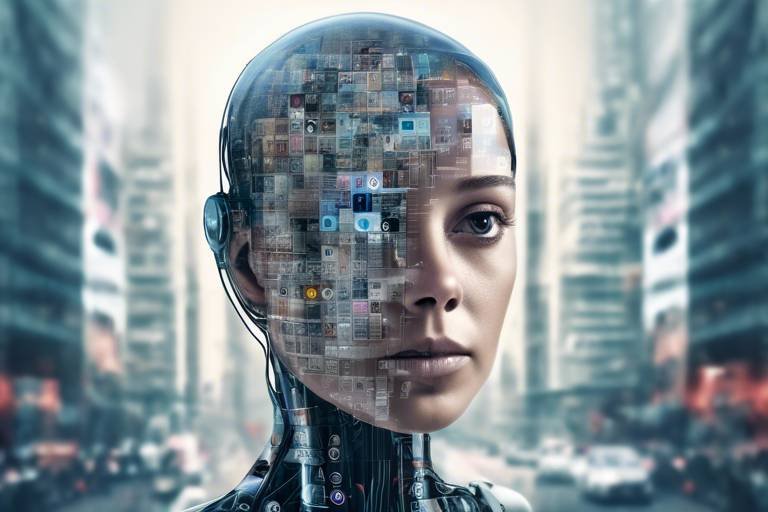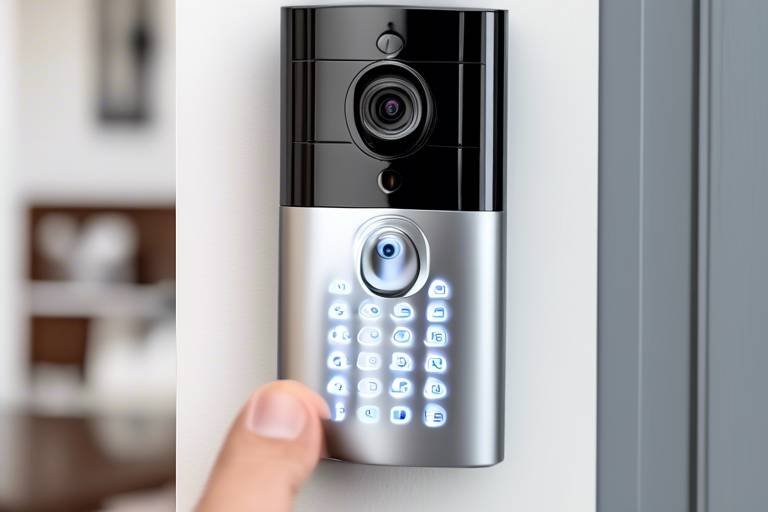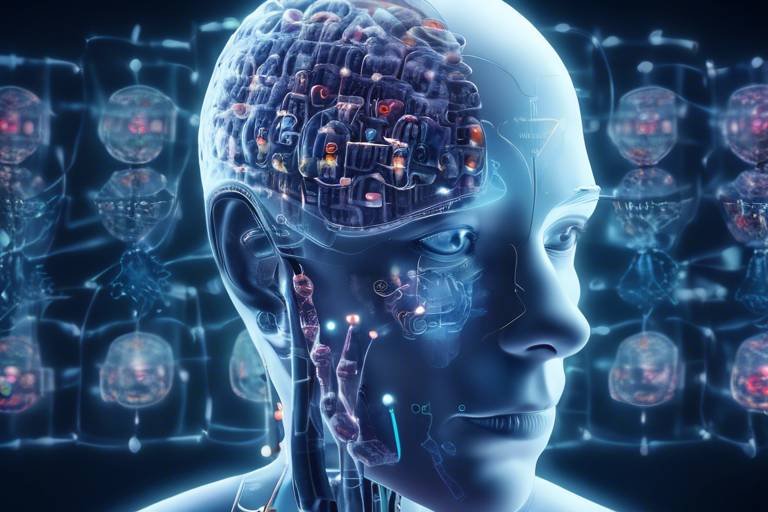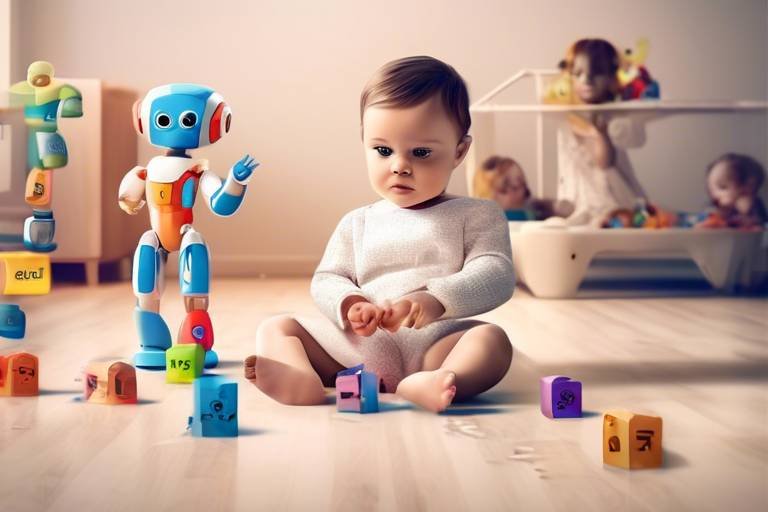Artificial Intelligence and the Future of Elderly Care
The landscape of elderly care is undergoing a remarkable transformation, and at the heart of this evolution is artificial intelligence (AI). Imagine a world where seniors can enjoy their golden years with enhanced independence, safety, and health management—all thanks to cutting-edge technology. AI is not just a buzzword; it’s a powerful tool that is reshaping how we approach care for our elderly population. As we delve into this topic, we will explore the various ways AI is making a difference, the benefits it brings to seniors, and the challenges that come with its implementation.
Artificial intelligence is revolutionizing elderly care by providing personalized solutions, enhancing communication, and improving overall service delivery. From smart home technologies that assist with daily tasks to automated health monitoring systems that track vital signs, AI is becoming an integral part of the caregiving process. This section examines AI's significant contributions to this sector, highlighting how these advancements are not only improving the quality of care but also enriching the lives of seniors.
AI technologies offer numerous benefits for seniors, including increased independence, safety monitoring, and tailored health management. With the help of AI, older adults can maintain a sense of autonomy while receiving the support they need. For instance, AI-driven systems can alert caregivers when a senior needs assistance, ensuring timely intervention without compromising their independence. Moreover, these technologies allow for personalized health management, adapting to the unique needs of each individual. The impact of these advancements on the daily lives of older adults is profound, as they can enjoy a better quality of life while feeling secure and supported.
Smart home technologies integrate AI to create safer living environments for seniors. These devices are designed to assist with daily tasks, enhancing overall comfort and security. For example, smart lighting systems can automatically adjust based on the time of day, reducing the risk of falls during the night. Additionally, smart appliances can be programmed to remind seniors to take their medications or perform essential tasks, ensuring they stay on track with their health routines.
Voice-activated assistants provide seniors with hands-free control over their home environment, improving accessibility and convenience. Imagine being able to turn on lights, adjust the thermostat, or even make phone calls simply by speaking. This technology not only facilitates communication but also empowers seniors to manage their daily activities with ease. It’s like having a personal assistant available 24/7, ready to help with whatever they need.
Automated health monitoring systems utilize AI to track vital signs and health metrics, allowing for timely interventions. These technologies can continuously monitor heart rates, blood pressure, and other critical health indicators, sending alerts to caregivers if anything seems amiss. This proactive approach to health management can prevent potential emergencies and provide peace of mind for both seniors and their families.
AI is reshaping healthcare services by streamlining processes and improving diagnosis and treatment options for the elderly. With AI algorithms analyzing vast amounts of data, healthcare providers can make more informed decisions, leading to better outcomes for patients. This integration of AI in clinical settings is not just about efficiency; it’s about enhancing the overall quality of care that seniors receive.
Despite its benefits, implementing AI in elderly care presents challenges, including ethical concerns and data privacy issues. As we embrace these technologies, it’s crucial to address the hurdles that need to be overcome for successful integration. Understanding these challenges is essential for ensuring that AI is used responsibly and effectively in elderly care.
Ethical considerations surrounding AI in elderly care focus on consent, autonomy, and the potential for bias. As we implement AI technologies, we must ask ourselves: Are we respecting the autonomy of our seniors? Are we ensuring that these systems are free from bias? Delving into these moral implications is vital for fostering trust and ensuring that AI serves as a beneficial tool rather than a detriment to elderly care.
Data privacy and security are critical concerns when utilizing AI in elderly care. With sensitive information being collected and analyzed, it is imperative to protect this data and ensure compliance with regulations. Safeguarding personal information not only builds trust with seniors and their families but also helps in creating a secure environment where technology can thrive.
Q1: How is AI improving elderly care?
AI enhances elderly care through personalized solutions, smart home technologies, and automated health monitoring, allowing seniors to live more independently and safely.
Q2: What are the ethical concerns related to AI in elderly care?
Ethical concerns include issues of consent, autonomy, and potential biases in AI systems, which need to be addressed to ensure responsible use of technology.
Q3: How does AI help in health management for seniors?
AI helps in health management by continuously monitoring vital signs and sending alerts for timely interventions, thus preventing emergencies and promoting proactive care.
Q4: What challenges does AI face in elderly care?
Challenges include ethical considerations, data privacy concerns, and the need for regulatory compliance to ensure the safe and effective use of AI technologies.

The Role of AI in Elderly Care
Artificial intelligence is not just a buzzword; it’s a game-changer in the realm of elderly care. Imagine a world where technology works hand-in-hand with caregivers to provide a seamless experience for seniors. AI is stepping into this role, offering personalized solutions that cater to the unique needs of older adults. From enhancing communication between seniors and their families to streamlining service delivery, the impact of AI is profound.
One of the most significant contributions of AI in elderly care is its ability to analyze vast amounts of data quickly. This capability allows for tailored health management plans that adapt to the changing needs of seniors. For instance, AI can monitor health metrics, predict potential health issues, and suggest timely interventions. This proactive approach is akin to having a personal health assistant who is always a step ahead, ensuring that seniors receive the care they need before a problem escalates.
Moreover, AI is enhancing communication in ways we never thought possible. Consider the scenario where a senior feels isolated or lonely. AI-powered applications can facilitate virtual interactions with family and friends, bridging the gap created by distance. By integrating voice recognition and natural language processing, these applications allow seniors to engage in conversations effortlessly, making them feel more connected to their loved ones.
In addition to communication, AI is revolutionizing the way services are delivered in elderly care facilities. For example, AI systems can optimize staff schedules, ensuring that caregivers are available when needed most. This not only improves the quality of care but also enhances job satisfaction among caregivers, creating a positive feedback loop that benefits everyone involved.
To illustrate the role of AI in elderly care, let's look at a few key areas where AI is making a significant difference:
| Area of Impact | Description |
|---|---|
| Health Monitoring | AI systems track vital signs, allowing for timely medical interventions. |
| Communication Enhancement | AI applications facilitate virtual interactions, reducing feelings of isolation. |
| Service Optimization | AI improves staff scheduling and resource allocation in care facilities. |
As we delve deeper into the integration of AI in elderly care, it becomes evident that this technology is not merely a tool but a partner in enhancing the quality of life for seniors. The future looks promising, with AI paving the way for a more connected, safer, and healthier environment for our aging population.
- What is AI in elderly care? AI in elderly care refers to the use of artificial intelligence technologies to improve the quality of care provided to seniors.
- How does AI enhance communication for seniors? AI tools can facilitate virtual conversations and interactions, helping seniors stay connected with their families and friends.
- Are there any risks associated with AI in elderly care? Yes, there are challenges such as data privacy concerns and ethical considerations that need to be addressed.

Benefits of AI for Seniors
Artificial Intelligence (AI) is not just a technological marvel; it’s a game-changer for the elderly population. Imagine a world where seniors can maintain their independence while receiving the care they need, all thanks to cutting-edge technology. AI technologies offer a plethora of benefits that significantly enhance the daily lives of older adults. From increased independence to enhanced safety monitoring, the impact of AI is profound and multifaceted.
One of the most remarkable benefits of AI for seniors is the ability to promote independence. With AI-driven solutions, older adults can manage their daily activities with greater ease. For instance, smart home devices can automate tasks such as adjusting lighting or controlling appliances, allowing seniors to live more comfortably without constant assistance. This not only fosters a sense of autonomy but also boosts their confidence. After all, who wouldn’t want to feel in control of their own home?
Safety is another critical aspect where AI shines. With the integration of advanced monitoring systems, families can rest assured knowing that their loved ones are safe. For example, AI-powered sensors can detect falls or unusual movements, immediately alerting caregivers or emergency services. This kind of proactive safety monitoring can be a lifesaver, literally. It’s like having a vigilant guardian watching over seniors, ensuring they are protected at all times.
Moreover, AI facilitates tailored health management, which is crucial for seniors dealing with chronic conditions. Automated health monitoring systems can track vital signs such as heart rate, blood pressure, and glucose levels, providing real-time data to both seniors and their healthcare providers. This allows for timely interventions and personalized care plans. Imagine receiving a notification on your smartphone that prompts you to take your medication or alerts you to a concerning change in your health metrics. It’s like having a personal health assistant right in your pocket!
Additionally, AI technologies can enhance social connections for seniors. Many older adults experience loneliness, which can adversely affect their mental and emotional well-being. AI-driven communication tools, such as video calling platforms and social robots, can help bridge the gap between seniors and their loved ones. These tools make it easier for seniors to stay connected with family and friends, reducing feelings of isolation. Picture a senior chatting with their grandchild over video call, sharing stories and laughter—what a beautiful way to stay connected!
In summary, the benefits of AI for seniors are vast and impactful. From promoting independence and safety to facilitating tailored health management and enhancing social connections, AI is paving the way for a brighter future for the elderly. As we continue to embrace these technologies, we can expect to see even more innovative solutions that will enrich the lives of our senior population.
- How does AI improve safety for seniors? AI enhances safety through monitoring systems that can detect falls or unusual behavior, alerting caregivers immediately.
- Can AI help seniors manage their health? Yes, AI can track vital signs and health metrics, allowing for personalized care and timely medical interventions.
- What role do smart home technologies play? Smart home technologies automate daily tasks, making it easier for seniors to live independently and comfortably.
- Are there any social benefits of using AI for seniors? Absolutely! AI-driven communication tools help seniors maintain social connections, reducing feelings of loneliness.

Smart Home Technologies
Smart home technologies are at the forefront of transforming the living environments of seniors, making everyday tasks easier and enhancing their overall quality of life. Imagine a home where everything is interconnected, responding to your needs almost intuitively. This is the reality that smart home technologies are creating for older adults. These innovations not only promote independence but also foster a sense of security and comfort that is essential for seniors living alone. With devices that can monitor health, adjust lighting, and even help with medication reminders, the potential for improving daily life is immense.
One of the most exciting aspects of smart home technologies is their ability to integrate various systems into a cohesive unit. For instance, a smart home can utilize sensors that detect when a senior has fallen or is in distress, immediately alerting caregivers or emergency services. This level of proactive care can be life-saving. Additionally, smart devices can help manage everyday tasks, such as:
- Automated lighting that turns on and off based on movement, reducing the risk of falls in dark areas.
- Smart thermostats that adjust the temperature automatically for comfort and energy savings.
- Smart locks that allow seniors to control access to their homes remotely, providing peace of mind.
Moreover, these technologies can be tailored to meet the specific needs of each individual. For instance, if a senior has difficulty remembering to take their medications, smart pill dispensers can be programmed to remind them at the appropriate times, ensuring they stay on track with their health management. The integration of AI in these devices means they can learn and adapt to the user’s habits, providing a truly personalized experience.
However, while the benefits are clear, it’s essential to consider the learning curve that comes with adopting these technologies. Some seniors may feel overwhelmed by the complexity of smart devices, which can hinder their willingness to embrace such changes. Therefore, education and support are crucial in helping older adults navigate this new landscape. Family members and caregivers can play a significant role by assisting in the setup and providing ongoing support, ensuring that seniors feel comfortable and confident in using these technologies.
In conclusion, smart home technologies represent a remarkable advancement in elderly care. They not only enhance safety and independence but also provide a level of convenience that can significantly improve the quality of life for seniors. As these technologies continue to evolve, we can expect even more innovative solutions that will further empower older adults to live fulfilling, independent lives.
- What are smart home technologies?
Smart home technologies refer to devices and systems that automate tasks and enhance the living environment through connectivity and control, often using AI to adapt to user needs. - How can smart home technologies benefit seniors?
These technologies can enhance safety, promote independence, and improve daily living through automated systems that assist with tasks like medication management, lighting, and security. - Are smart home devices easy to use for seniors?
While some devices may have a learning curve, with proper education and support from family or caregivers, many seniors can successfully use smart home technologies. - What should I consider before installing smart home technologies for my elderly loved one?
Consider their comfort with technology, the specific needs they have, and the level of support you can provide to help them adapt to these new tools.

Voice-Activated Assistants
Voice-activated assistants are rapidly becoming an essential part of daily life for seniors, transforming their homes into more accessible and manageable environments. These smart devices, powered by artificial intelligence, allow older adults to control various aspects of their home simply by using their voice. Imagine waking up in the morning and saying, "Good morning, Alexa," to have the coffee maker start brewing your favorite blend, the lights gradually brighten, and the morning news begin to play. This kind of convenience is not just a luxury; it's a game-changer for many seniors who may struggle with mobility or technology.
One of the most significant advantages of voice-activated assistants is their ability to enhance communication. Seniors can easily reach out to family members or friends without the need to fumble with a phone or tablet. With a simple command, they can make calls, send messages, or even video chat, bridging the gap between generations and fostering social connections that are vital for mental health. This is particularly important as many older adults experience isolation, and technology can help them feel more connected to the world around them.
Moreover, voice-activated assistants can help seniors manage their daily activities more effectively. For instance, they can set reminders for medication, appointments, or even daily tasks like watering plants or taking out the trash. Think of it as having a personal assistant who never forgets anything! This level of organization not only promotes independence but also significantly reduces the cognitive load on seniors, allowing them to focus on what brings them joy.
However, it's essential to recognize that while these devices offer incredible benefits, they also come with considerations. Privacy concerns are at the forefront, as these assistants are always listening for commands. Seniors and their families must be informed about how their data is used and stored. Transparency from tech companies about data privacy is crucial to ensure that users feel safe and secure in their homes.
In summary, voice-activated assistants are revolutionizing the way seniors interact with their living spaces and maintain their independence. By providing hands-free control, enhancing communication, and streamlining daily tasks, these devices are not just technological novelties; they are becoming indispensable tools that can significantly improve the quality of life for older adults. As we continue to embrace these innovations, it is vital to remain mindful of the ethical and privacy implications to ensure that all seniors can benefit from this exciting technological advancement.
- What are voice-activated assistants?
Voice-activated assistants are AI-powered devices that respond to spoken commands, allowing users to control various functions in their homes and access information easily. - How can voice-activated assistants help seniors?
They can assist with communication, set reminders, control smart home devices, and provide entertainment, all through simple voice commands. - Are there privacy concerns with using voice-activated assistants?
Yes, seniors and their families should be aware of how their data is collected and used, and choose devices with strong privacy protections.

Automated Health Monitoring
In the rapidly evolving landscape of elderly care, has emerged as a game-changer, providing seniors and their caregivers with essential tools to maintain health and well-being. Imagine a world where your health metrics are monitored in real-time, allowing for timely interventions that can prevent serious health issues. This is not just a futuristic vision; it is the reality created by advanced AI technologies.
Automated health monitoring systems utilize a variety of devices that track vital signs such as heart rate, blood pressure, and even blood glucose levels. These devices can be worn as smartwatches, embedded in clothing, or placed throughout the home, continuously gathering data without requiring any manual input from the user. This seamless integration into daily life means that seniors can go about their routines without the burden of constant health checks, all while ensuring that their health is closely monitored.
One of the most significant advantages of these systems is their ability to alert caregivers or medical professionals in case of anomalies. For instance, if a senior's heart rate spikes unexpectedly, the system can send an instant alert, prompting immediate action. This level of proactive health management can be life-saving, particularly for those with chronic conditions. Furthermore, the data collected can be analyzed over time, enabling healthcare providers to identify trends and make informed decisions regarding treatment plans.
Consider a scenario where a senior living alone experiences a sudden health issue. An automated monitoring system can detect irregularities and automatically notify emergency services or a family member, ensuring that help arrives swiftly. This not only enhances the safety of elderly individuals but also provides peace of mind to their families. The integration of these technologies into elderly care is akin to having a vigilant guardian watching over loved ones, ready to spring into action when necessary.
Moreover, the data collected from these systems can be invaluable for healthcare professionals. By having access to comprehensive health records, doctors can make better diagnoses and tailor treatments to individual needs. This personalized approach to healthcare can significantly improve outcomes for seniors, as treatments can be adjusted based on real-time data rather than relying solely on periodic check-ups.
In summary, automated health monitoring is not just about technology; it is about enhancing the quality of life for seniors. By providing peace of mind, improving safety, and enabling proactive health management, these systems represent a significant leap forward in elderly care. As we continue to embrace these innovations, we can look forward to a future where seniors live healthier, more independent lives, supported by the power of artificial intelligence.
- What types of devices are used in automated health monitoring?
Devices range from smartwatches and fitness trackers to specialized medical devices that monitor vital signs like heart rate and blood pressure. - How does automated health monitoring improve safety for seniors?
These systems can alert caregivers or medical professionals in case of anomalies, allowing for timely interventions and reducing the risk of serious health issues. - Can automated health monitoring help with chronic conditions?
Yes, by tracking vital signs and health metrics continuously, these systems enable healthcare providers to adjust treatment plans based on real-time data. - Is my data safe with automated health monitoring systems?
Most systems prioritize data privacy and security, employing encryption and compliance with regulations to protect sensitive information.

AI in Healthcare Services
Artificial Intelligence is not just a buzzword; it’s rapidly becoming an integral part of the healthcare landscape, particularly for our elderly population. Imagine a world where healthcare is not only more efficient but also more personalized. AI technologies are stepping into this arena, transforming how we diagnose and treat ailments in seniors. From predictive analytics to machine learning algorithms, AI is revolutionizing the way healthcare providers interact with their patients.
One of the most significant advancements is the ability of AI to analyze vast amounts of data quickly. This means that healthcare professionals can now access real-time insights into a patient’s health status, allowing for timely interventions. For instance, AI systems can predict potential health issues by analyzing patterns in a senior's medical history, lifestyle choices, and even genetic information. This proactive approach can lead to early detection of diseases, which is crucial for effective treatment, especially in older adults who may have multiple health concerns.
Moreover, AI is enhancing diagnostic accuracy. Traditional methods can sometimes lead to misdiagnosis or delayed treatment, but AI algorithms can sift through numerous medical records and research studies to identify the most likely conditions based on a patient’s symptoms. This not only speeds up the diagnosis process but also ensures that seniors receive the most appropriate care tailored to their unique health profiles.
Another exciting development is the use of AI-powered telehealth services. These platforms allow seniors to consult with healthcare providers from the comfort of their homes, reducing the need for travel and making healthcare more accessible. With the help of AI, these systems can triage patients effectively, directing them to the right specialist based on their symptoms. This seamless integration of technology into healthcare not only saves time but also enhances the overall patient experience.
Furthermore, AI is being used in medication management. For seniors who often juggle multiple prescriptions, keeping track of dosages and schedules can be overwhelming. AI-driven applications can send reminders, monitor adherence, and even alert caregivers if a dose is missed. This smart approach helps ensure that seniors take their medications correctly, which is vital for managing chronic conditions and maintaining overall health.
In summary, the integration of AI in healthcare services is a game-changer for elderly care. It empowers healthcare providers to deliver more accurate, timely, and personalized care, ultimately improving the quality of life for seniors. As we continue to embrace these technological advancements, it’s essential to keep the conversation going about how we can harness AI’s potential while addressing the challenges it brings.
- What are the main benefits of AI in elderly healthcare? AI enhances diagnostic accuracy, improves medication management, and facilitates remote consultations.
- How does AI improve patient care for seniors? By analyzing data for early detection of diseases and personalizing treatment plans.
- Are there any risks associated with using AI in healthcare? Yes, there are concerns regarding data privacy and the ethical implications of AI decision-making.
- Can AI replace human healthcare providers? No, AI is meant to assist healthcare providers, not replace them. Human touch and empathy are irreplaceable in patient care.

Challenges of Implementing AI
While the integration of artificial intelligence (AI) into elderly care presents a plethora of opportunities, it is not without its challenges. The journey towards effectively utilizing AI technologies in this sensitive sector is paved with hurdles that need to be carefully navigated. One of the primary concerns is the ethical implications surrounding the use of AI. Questions about consent and autonomy arise, especially when AI systems are making decisions that affect the well-being of seniors. How do we ensure that the voices of the elderly are heard in a world increasingly dominated by algorithms?
Moreover, there exists a significant risk of bias in AI systems. If the data used to train these systems is not representative of the diverse elderly population, it can lead to skewed results and unfair treatment. This brings us to the importance of inclusive data collection practices that reflect the varied backgrounds and experiences of older adults. Without this, AI could inadvertently perpetuate existing inequalities in healthcare.
Another pressing challenge is data privacy and security. As AI systems gather and analyze vast amounts of personal data, the potential for breaches becomes a serious concern. Protecting sensitive information is paramount, not just for compliance with regulations like GDPR, but also for maintaining trust between seniors and care providers. Imagine a scenario where a senior's health data is leaked; the repercussions could be devastating, not only for the individual but also for the reputation of the care system as a whole.
To illustrate these challenges, consider the following table that outlines key issues associated with AI in elderly care:
| Challenge | Description |
|---|---|
| Ethical Concerns | Issues related to consent, autonomy, and potential bias in AI decision-making. |
| Data Privacy | Risks associated with the collection, storage, and use of sensitive personal data. |
| Implementation Costs | High costs involved in developing and maintaining AI systems can be prohibitive. |
| Technological Literacy | Need for training both seniors and caregivers to effectively use AI technologies. |
Furthermore, the cost of implementation cannot be overlooked. Developing and maintaining sophisticated AI systems can require substantial financial investment, which might not be feasible for all care facilities, particularly those that are already struggling with limited budgets. This raises the question: how can we ensure equitable access to AI technologies across different care settings?
Lastly, there’s the issue of technological literacy. For AI to be effective in elderly care, both seniors and caregivers must be equipped with the skills to utilize these advanced technologies. This necessitates comprehensive training programs that cater to the varying levels of comfort and familiarity with technology among older adults. In a world where technology evolves rapidly, how do we provide ongoing support to ensure that no one is left behind?
In conclusion, while the potential of AI in elderly care is immense, navigating the associated challenges will require a concerted effort from all stakeholders involved. By addressing ethical considerations, ensuring data privacy, managing costs, and enhancing technological literacy, we can pave the way for a future where AI truly enhances the quality of life for seniors.
- What are the main ethical concerns regarding AI in elderly care?
The main ethical concerns include issues of consent, autonomy, and the risk of bias in AI decision-making processes. - How can data privacy be ensured in AI systems?
Implementing strong data protection measures, complying with regulations, and maintaining transparency are crucial for ensuring data privacy. - What are the costs associated with implementing AI in elderly care?
The costs can vary widely depending on the technology and infrastructure needed, which can be a barrier for many care facilities. - How can seniors be trained to use AI technologies?
Training programs tailored to the needs of seniors can help them gain the necessary skills to effectively use AI tools in their daily lives.

Ethical Considerations
As we dive into the realm of artificial intelligence in elderly care, we cannot overlook the critical that accompany these technological advancements. The integration of AI into the lives of seniors raises several profound questions about consent, autonomy, and the potential for bias. Each of these elements plays a pivotal role in ensuring that the use of AI enhances the quality of life for older adults rather than diminishing it.
First and foremost, the issue of consent is paramount. Many seniors may not fully understand the technology being implemented in their care, leading to situations where they may unwittingly give consent to data collection or monitoring. It’s crucial that caregivers and service providers ensure that seniors are not only informed but also comfortable with the technologies being used. This involves clear communication about what data is being collected, how it will be used, and who will have access to it.
Next, we must consider autonomy. AI can significantly enhance independence for seniors, allowing them to manage their daily lives more effectively. However, there is a fine line between assistance and control. For example, while a smart home system can remind a senior to take their medication, it should not override their personal choices or preferences. Maintaining a balance where technology supports rather than dictates a senior's lifestyle is essential.
Additionally, the potential for bias in AI algorithms cannot be ignored. If the data used to train AI systems reflects societal biases, there is a risk that these biases will be perpetuated in the care provided to seniors. This could lead to unequal treatment based on age, gender, ethnicity, or other factors. Developers and stakeholders must be vigilant in ensuring that AI systems are designed to be fair and equitable, actively working to eliminate any biases that could affect outcomes.
To summarize, the ethical considerations surrounding AI in elderly care are multi-faceted and complex. They require ongoing dialogue among technologists, healthcare providers, and the elderly themselves to ensure that the benefits of AI do not come at the expense of ethical standards. Addressing these concerns head-on will be vital in paving the way for a future where AI enhances the lives of seniors while respecting their rights and dignity.
- What are the main ethical concerns regarding AI in elderly care? The primary concerns include consent, autonomy, and potential bias in AI algorithms.
- How can we ensure that seniors understand the technologies used in their care? Clear communication and education about the technology are essential for informed consent.
- What measures can be taken to prevent bias in AI systems? Developers should use diverse datasets and continuously monitor AI systems for fairness and equity.

Data Privacy and Security
When it comes to integrating artificial intelligence in elderly care, one of the most pressing concerns is . As AI systems collect and analyze vast amounts of personal information, including health metrics and daily activities, the potential for misuse or unauthorized access to this sensitive data becomes a significant issue. Imagine a world where your health data is not just numbers but a treasure trove of your most intimate details, accessible to anyone with the right hacking skills. That’s a scary thought, isn’t it?
To ensure that the benefits of AI in elderly care do not come at the cost of personal privacy, it is crucial to establish robust data protection measures. This includes implementing strong encryption protocols, regular security audits, and strict access controls. Moreover, organizations must comply with regulations such as the Health Insurance Portability and Accountability Act (HIPAA) in the U.S. and the General Data Protection Regulation (GDPR) in Europe, which set stringent guidelines for handling personal data.
Consider the following key aspects of data privacy and security in the context of AI for elderly care:
- Informed Consent: Seniors and their families should be fully aware of what data is being collected, how it will be used, and who will have access to it.
- Data Minimization: Only collect data that is absolutely necessary for the intended purpose. This reduces the risk of exposing sensitive information.
- Regular Audits: Conduct frequent security assessments to identify vulnerabilities in the system and to ensure compliance with privacy regulations.
Moreover, it is essential to foster a culture of transparency and trust between caregivers, technology providers, and the elderly. By openly communicating about data practices and security measures, stakeholders can alleviate fears and encourage the adoption of these advanced technologies. After all, the goal is to enhance the quality of life for seniors, not to compromise their safety.
In conclusion, while the integration of AI in elderly care offers revolutionary advancements, it is imperative to prioritize . By addressing these concerns proactively, we can ensure that technology serves as a helpful ally rather than a potential threat. As we move forward, the challenge lies in balancing innovation with the ethical responsibility to protect our vulnerable populations.
- What are the main concerns regarding data privacy in AI for elderly care?
Data privacy concerns primarily revolve around unauthorized access to personal information, misuse of sensitive data, and ensuring compliance with legal regulations. - How can organizations ensure data security when using AI?
Organizations can implement strong encryption, conduct regular security audits, and adhere to data protection regulations to safeguard personal information. - What role does informed consent play in data privacy?
Informed consent ensures that seniors and their families understand what data is being collected and how it will be used, fostering trust and transparency.
Frequently Asked Questions
- What is the role of AI in elderly care?
AI plays a transformative role in elderly care by offering personalized solutions that enhance communication and improve service delivery. It helps in creating tailored experiences for seniors, ensuring they receive the care and attention they need, while also promoting their independence.
- What benefits does AI provide for seniors?
AI technologies provide numerous benefits for seniors, such as increased independence, safety monitoring, and personalized health management. These advancements can significantly enhance the daily lives of older adults by ensuring they feel secure and supported in their living environments.
- How do smart home technologies assist seniors?
Smart home technologies utilize AI to create safer and more comfortable living environments for seniors. Devices like smart lights, thermostats, and security systems help with daily tasks, thereby improving overall comfort and security, allowing seniors to live more independently.
- What are voice-activated assistants, and how do they help?
Voice-activated assistants are AI-driven devices that enable seniors to control their home environment hands-free. They enhance accessibility and convenience, allowing seniors to manage daily activities and communicate easily without needing to physically interact with devices.
- How does automated health monitoring work?
Automated health monitoring systems use AI to track vital signs and health metrics in real-time. This allows for timely interventions and proactive health management, ensuring that seniors receive the necessary care before potential health issues escalate.
- What challenges are associated with implementing AI in elderly care?
Implementing AI in elderly care comes with challenges such as ethical concerns, data privacy issues, and the potential for bias. Addressing these hurdles is essential for ensuring that AI technologies are used responsibly and effectively in caring for seniors.
- What ethical considerations should be taken into account?
Ethical considerations in the use of AI in elderly care include issues related to consent, autonomy, and the potential for bias in decision-making. It's crucial to navigate these moral implications to ensure that seniors are treated with respect and dignity.
- How is data privacy ensured when using AI?
Data privacy is critical when utilizing AI in elderly care. Measures must be taken to protect sensitive information and ensure compliance with regulations. This includes implementing strong security protocols and ensuring that seniors' data is handled with care and respect.



















